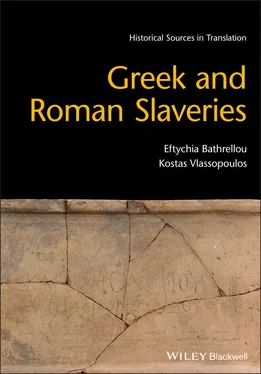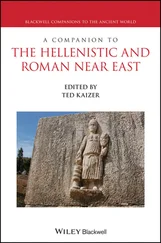1 ...7 8 9 11 12 13 ...19 How is Plutarch’s emotional state portrayed in this passage? Can we learn something about masters’ mentality from Plutarch’s response?
How does this master–slave negotiation relate to that described in 1.19?
What conclusions should we draw from the fact that the slave has learned some of his master’s philosophy?
What conclusions can we draw about slave agency from this passage?
How does this passage illustrate both the asymmetry and the negotiation that slavery involves?
1.23 Digest , 1.6.1–2: Collection of Latin Juristic Texts (Sixth Century CE)
On the Digest, see 1.2.
Literature: Härtel 1977; Knoch 2017: 111–18.
Gaius, Institutes , Book 1:
Slaves are under the power ( potestas ) of their masters. This power is derived from the law of nations, for we can observe that equally among all nations masters have had power of life and death over their slaves. Whatever acquisition is made via the slave is made by the master. In our times, however, no man who is a subject of the Roman Empire is permitted to act against his slaves with excessive brutality and without a cause acknowledged by the laws. For, through an enactment of the divine (emperor) Antoninus, one who kills his own slave without cause is to be punished in the same way as one who has killed the slave of another. But even excessive harshness of masters is also curbed via an enactment of the same emperor.
Ulpian, On the Duties of the Provincial Governor , Book 8:
If a master acts brutally against his slaves or forces them to indecency and disgraceful violation, the tasks of the governor are stated in the rescript addressed by the divine Antoninus Pius to Aelius Marcianus, the governor of the province of Baetica. The terms of this rescript are the following: “It is certainly proper that the power ( potestas ) of the masters over their slaves be unimpaired and that no man’s rights be taken from him. However, it is in the interest of the masters not to deny relief to those who justly implore for help against brutality or starvation or intolerable insult. For this reason, investigate the complaints of the slaves of the household of Julius Sabinus who fled and took refuge at my statue. If you find that they have been treated more harshly than is fair or subjected to infamous insult, order that they be sold on the condition that they may not come back under the power ( potestas ) of their present master. And if he should fraudulently evade my decision, he should know that I will pursue the punishment of this offence more severely.” Also, the divine (emperor) Hadrian ordered the banishment from Rome for a five-year period of one Umbricia, a married woman of good family, because she had treated her female slaves in the most savage way for extremely trivial reasons.
What powers do masters have to punish their slaves? Cf. 5.1.
How did Roman emperors limit the masters’ right to punishment?
How is this limitation justified?
How did the slaves of Julius Sabinus attempt to escape their cruel master? Cf. 6.14–5.
1.24 Libanius, Orations , 47.21: Greek Epideictic Oratory (Fourth Century CE)
Libanius uses an analogy in order to persuade the emperor of the need to prevent tenants of agricultural land around Antioch in Syria from requesting help from people other than the owners of the land they cultivate.
Nor is it right that a slave who demands justice for wrongs he has suffered should look to someone else and present himself before someone who has no proper authority over him and beg for that man’s help, thereby bypassing his master. For he would no longer belong to his master entirely but would surrender a large share of himself – both of his goodwill and his labor – to the person who assisted him. It is indeed right that he receive justice, but he should receive it through his master. The result of a slave’s securing justice through someone else is often that the master could be deprived of his slave, becoming the object of the slave’s contempt because of the other man’s assistance.
Why should slaves ask only their masters for help?
What was the danger if they asked other people for help? How does this relate with 1.23?
What implications does this passage have for slavery as a relationship? Did it involve only masters and their slaves?
1.25 Gerontius, Life of Melania, 10: Saint’s Life in Greek (Fifth Century CE)
A little before the sack of Rome by the Visigoths in 410 CE, the extremely wealthy Roman aristocrats Melania the Younger and her husband Pinianus are planning to liquidate their property to donate the money to the Church. Cf. 11.14.c, on the reaction of some slaves to the Visigothic invasion.
Literature: Roth 2005; Harper 2011: 192–5; Vlassopoulos 2018a.
And while Melania and Pinianus were making these plans, the enemy of truth, the devil, raised a most challenging trial for them. He felt envy at the young couple’s godly fervor and suborned Severus, the brother of the blessed Pinianus, and he convinced the slaves of Melania and Pinianus to say: “By no means are we being put up for sale! If we are forced, rather than being put on the market, we will have your brother Severus as our master, and he will buy us himself.” This disturbed them greatly, seeing their slaves in their estates around Rome revolting.
How do the slaves react to the news of their being put on the market? Why? What difference would it make to them?
What proposal do they make? Why?
How do the wishes of Severus and the slaves fit in together?
What does the intervention of Severus tell us about the factors that shape slavery as a negotiation?
1.26 Aristophanes, Clouds , 1–7: Greek Comedy (Late Fifth Century BCE)
This comedy was written in Athens during the course of the Peloponnesian War. The speaker is an old Athenian man.
Literature: Hanson 1992; Demont 2007.
Oh dear, oh dear! Oh, king Zeus, what a piece of work this night has been! Unending. Won’t day ever come? Yet, I heard a cock crow long ago. But the slaves are snoring. They wouldn’t have done this before. Oh war, be damned, for the many evils you’ve brought. For now, I can’t even punish my slaves.
Why can the speaker not punish his slaves as he used to?
Is this comic exaggeration? Cf. 11.11.c.
Which factors can affect slavery apart from slaves and masters?
How can these factors affect slavery as an asymmetrical negotiation?
MODALITIES OF SLAVERY
1.27 Artemidorus, The Interpretation of Dreams : Greek Dream Book (Second Century CE)
Literature: Annequin 1987, 2005; Kudlien 1991; Pomeroy 1991; Vlassopoulos 2018a; Thonemann 2020.
1.48: To dream that one’s own feet are on fire is a bad sign for everyone equally and signifies loss and destruction of what one has, including one’s children and slaves. For, similar to slaves, children submit to their parents and serve them like slaves. This point is missed by many dream interpreters, who hold that feet signify only slaves.
1.62: If a slave competes in a sacred contest, wins, and receives a garland, he will be proclaimed free. For these achievements are characteristic of free men.
1.78: Having sex with one’s own slave, male or female, is good. For slaves are the possessions of the person who has had the dream. They thus signify that he will get pleasure from his possessions, which naturally happens when they increase in quantity and value. To be penetrated by a slave is not a good sign for it signifies that one will be harmed by the slave and become the object of the slave’s contempt.
2.8: Rain, hurricane, and stormy weather bring on dangers and harm. Only to slaves, poor men, and those who are in difficulty do they foretell relief from their present troubles. For great storms are followed by fair weather.
Читать дальше












